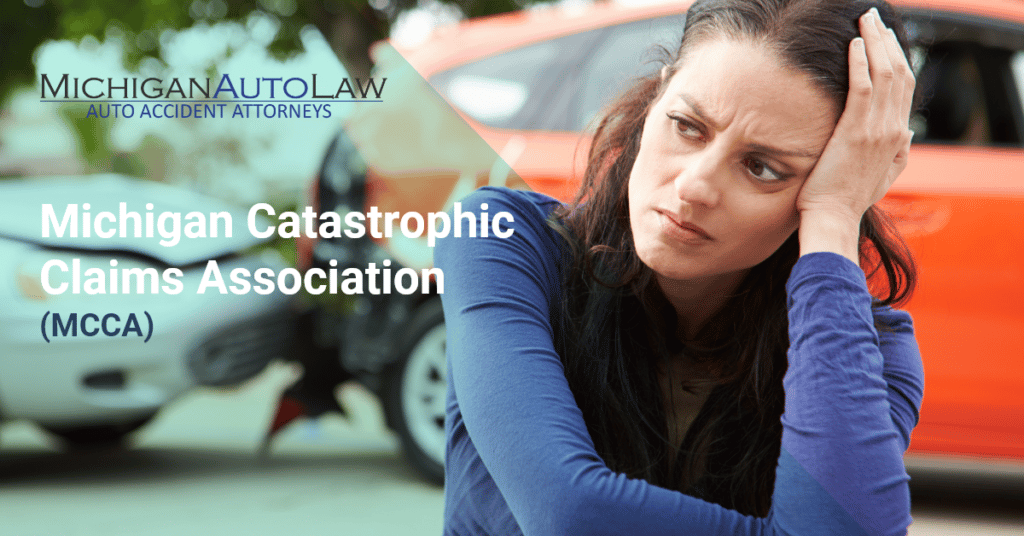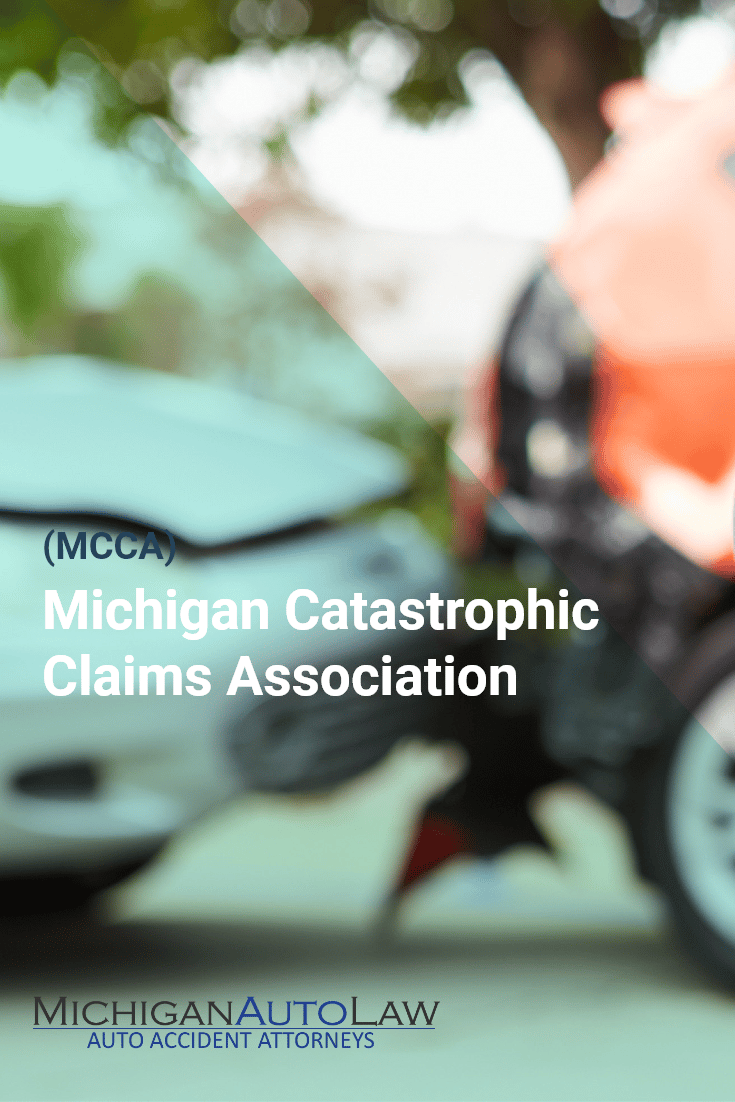Michigan Catastrophic Claims Association (MCCA)

The Michigan Catastrophic Claims Association (MCCA) is an unincorporated, nonprofit association that was created by the Michigan Legislature for the sole purpose of paying for the car accident-related No-Fault medical expenses of catastrophically injured car crash victims.
When does the Michigan Catastrophic Claims Association provide coverage?
Under Michigan law, an accident victim is deemed to be catastrophically injured and, thus, eligible for medical benefits coverage through the Michigan Catastrophic Claims Association when his or her crash-related medical expenses exceed the “retention” amount – which is $580,000 under an auto insurance policy that was issued or renewed during the period from July 1, 2019 to June 30, 2021. (MCL 500.3104(2)(o)).
Prior to that point, No-Fault medical benefits will be paid by the auto insurance company that issued the policy under which benefits are sought. In other words, until the retention amount is reached and the Michigan Catastrophic Claims Association gets involved, the auto insurer will “retain” the responsibility for paying benefits. The Association’s overall mission was not changed by the new No-Fault law.
To learn more, please check out this video:
Will the MCCA still provide catastrophic injury coverage under the new No-Fault law?
Once the new No-Fault PIP medical benefits coverage levels under the new No-Fault law (Public Acts 21 and 22 of 2019) become available after July 1, 2020, catastrophic injury coverage through the Michigan Catastrophic Claims Association will be available only under the following circumstances:
- If the No-Fault PIP medical benefits coverage level selected in the auto insurance policy through which a car accident victim is claiming benefits provides for “unlimited” or “no limit” No-Fault medical coverage. (MCL 500.3104(2))
- If a car accident victim is claiming No-Fault benefits through an auto insurance policy that was “issued or renewed before July 2, 2020.” (MCL 500.3104(2))
Importantly, fo the people who limit their No-Fault protection by choosing one of the lower PIP medical benefits coverage levels – $50,000 for drivers on Medicaid, $250,000, $500,000 or the opt-out for drivers on Medicare – the new auto No-Fault law will create major problems for them if tragedy strikes and they are catastrophically injured in a car crash or truck accident.
They will NEVER be able to recover No-Fault medical benefits paid through the MCCA. They will have no catastrophic personal injury coverage through the MCCA.
That’s because the Michigan Catastrophic Claims Association provides catastrophic coverage only if a person chooses to pay for catastrophic coverage by purchasing unlimited or “no limit.” This is also reflected in the fact that the only people who will have to pay the full MCCA assessment (an issue I will discuss in greater detail below) are the people who choose to have the protection of unlimited No-Fault PIP medical benefits coverage. This is a drastic change from our old auto No-Fault law in Michigan that will hurt hundreds of car crash victims every year.
Without the Michigan Catastrophic Claims Association, catastrophically injured car crash victims in Michigan will now be like those in every other state. They will be essentially on their own to pay for their bills. Their only other options would be: (1) Suing the at-fault driver for “excess” medical expenses; (2) Making a claim through a private health insurance plan, assuming they have one and it does not have auto accident exclusions or exceptions; (3) Seeking medical care from Medicaid or Medicare; (4) Making a claim under an “underinsured motorist” policy (in the event the at-fault driver doesn’t have the resources to settle an “excess” medical claim); or (5) Paying out-of-pocket.
Will the Michigan Catastrophic Claims Association help victims injured before the new No-Fault law?
Under the new No-Fault law that took effect June 11, 2019 (Public Acts 21 and 22 of 2019), the MCCA will continue to pay for the medical benefits of all catastrophically injured car accident victims who claim benefits under a No-Fault auto insurance policy that was “issued or renewed before July 2, 2020.” (MCL 500.3104(2))
However, for policies “issued or renewed after July 1, 2020,” which is when the new No-Fault PIP medical benefits coverage levels will become available, the MCCA will only pay for catastrophic injury benefits for those victims claiming benefits under a policy where the named insured on the policy has selected “unlimited” No-Fault PIP medical benefits coverage. (MCL 500.3104(2); 500.3104(27))
What is the Michigan Catastrophic Claims Association assessment?
The MCCA’s assessment is how the Association raises the funds it needs to pay for the No-Fault medical benefits of catastrophically injured car crash victims.
It is an annual, per-vehicle fee that the Michigan Catastrophic Claims Association charges to the auto insurance companies who are authorized by the State of Michigan to sell policies to Michigan drivers. (MCL 500.3104(7)(d) and (10)(c))
Here’s a fact most people don’t know: The insurance companies DO NOT actually shoulder the burden of the MCCA’s assessment costs.
The MCCA assessment costs fall on you and me . . . as drivers. With a mandate from the No-Fault law backing them up, auto insurers pass along the assessment costs to drivers in the form of higher auto insurance premiums. (See MCL 500.3104(20), formerly 500.3104(22))
The new No-Fault law enacted in 2019 has not changed the nature or purpose of the MCCA insurance assessment – nor the ability of insurers to pass it along to drivers.
Does the new No-Fault law get rid of the Michigan Catastrophic Claims Association assessment?
Practically speaking, no.
Until the new No-Fault PIP medical benefit coverage levels become available after July 1, 2020, all Michigan drivers will continue to pay the MCCA insurance assessment.
After the new coverage levels become available after July 1, 2020, here is how the MCCA insurance assessment will work:
- Drivers who will be required to pay the full MCCA assessment: Drivers who choose to maintain unlimited No-Fault PIP medical benefits will continue to pay the full MCCA insurance assessment, which covers payouts, expenses and deficit reduction (where necessary). (MCL 500.3104(7)(d))
- Drivers who may be required to pay the deficit portion of the MCCA assessment: Drivers who choose to no longer maintain unlimited coverage – because they have opted for one of the new coverage levels or opted-out of No-Fault PIP medical benefits coverage altogether – will only have to pay the portion of the MCCA insurance assessment that goes to paying down any deficits that the Michigan Catastrophic Claims Association is running. (MCL 500.3104(7)(d))(“ . . . the portion of the total premium [assessment] attributable to an adjustment for a deficiency in a previous period.”)
Will there be more transparency into the practices of the Michigan Catastrophic Claims Association?
The new No-Fault law addresses the issue of transparency into the assessment-setting process by requiring the Michigan Catastrophic Claims Association to submit an “Annual Consumer Statement, written in a manner intended for the general public,” to the House and Senate Insurance committees. (MCL 500.3104(25))
The issues addressed by the Annual Consumer Statement will include, but are not limited to:
- The number of claims opened during the preceding 12 months, the amount expended on the claims, and the future anticipated costs of the claims.
- For each of the preceding 10 years, the total number of open claims, the amount expended on the claims, and the anticipated future costs of the claims.
- For each of the preceding 10 years, the total number of claims closed and the amount expended on the claims.
- For each of the preceding 10 years, the ratio of claims opened to claims closed.
- For each of the preceding 10 years, the average length of open claims.
- A statement of the current financial condition of the association and the reasons for any deficit or surplus in collected assessments compared to losses.
- A statement of the assumptions, methodology, and data used to make revenue projections. As used in this subdivision, “revenue” means return on investments.
- A statement of the assumptions, methodology, and data used to make cost projections.
- A statement explaining what portion of the assessment to insureds as recognized in rates under subsection (20) is attributable to claims occurring in the previous 12 months, administrative costs, and the amount, if any, to adjust for past deficits.
- For each of the preceding 10 years, an injury type summary, categorizing the injuries suffered by claimants the payment of whose claims are being reimbursed by the association, by brain injuries, injuries resulting in quadriplegia, injuries resulting in paraplegia, burn injuries, and other injuries. (MCL 500.3104(25)(a) through (h), (l) and (o))
Is the Michigan Catastrophic Claims Association going to be refunding money to drivers?
Well, it’s possible. But I wouldn’t hold your breath.
The new No-Fault law provides that drivers will be refunded money from the Michigan Catastrophic Claims Association only under very limited circumstances.
Specifically, refunds from the Association will go out only if:
An “actuarial examination . . . shows that the assets of the association exceed 120% of its liabilities, including incurred but not reported liabilities, and if the refund will not threaten the association’s ongoing ability to provide reimbursements for personal protection insurance benefits based on sound actuarial principles consistent with the applicable statements of principles and the code of professional conduct adopted by the Casualty Actuarial Society . . .”(MCL 500.3104(22)
To learn more, please check out our video:
Injured and need a lawyer? Call Michigan Auto Law
If you have been injured in a car accident and you have questions about your legal rights to Michigan PIP benefits, you can call toll free anytime 24/7 at (800) 968-1001 for a free consultation with one of our experienced auto accident attorneys. You can also get help from an experienced accident attorney by visiting our contact page or you can use the chat feature on our website.






